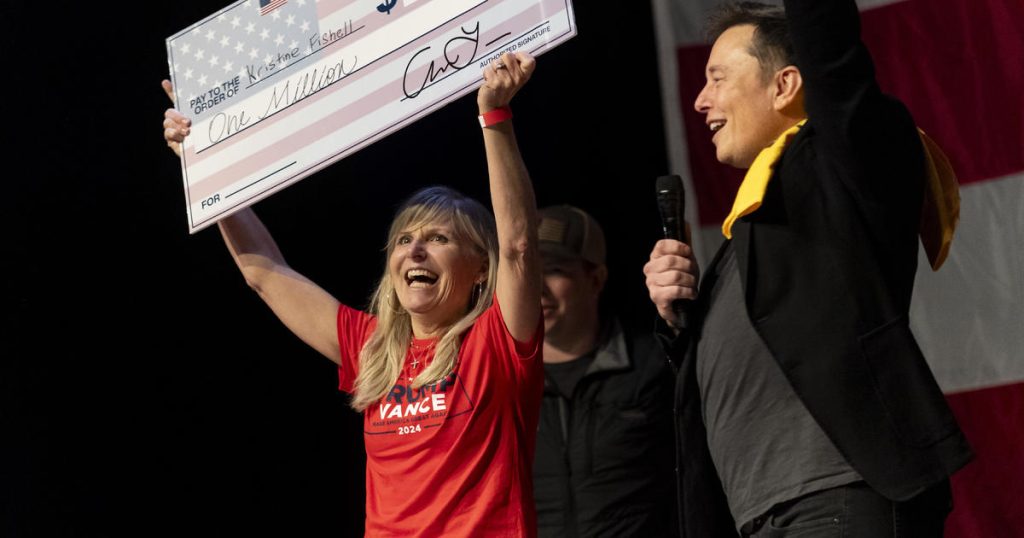Elon Musk did not appear in a Philadelphia courtroom as ordered by a judge in a civil case filed by District Attorney Larry Krasner over his super PAC’s plan to award $1 million a day to voters in key battleground states in the 2024 election. Musk’s attorneys requested the case be moved to federal court, and a judge granted the transfer. Krasner’s office indicated that they would contest this decision and seek to have the matter remanded back to state court since it involves state law issues. Musk has donated tens of millions of dollars to America PAC, a super PAC that supports the Republican candidate, and the lottery award goes to petition signers who support free speech and the right to bear arms.
The Philadelphia District Attorney, Larry Krasner, has filed a civil suit against Elon Musk, alleging illegal lotteries and interference with the integrity of elections due to his super PAC’s plan to award $1 million a day to voters. The Justice Department also sent a letter to the super PAC warning that it may be violating federal laws about paying voters. Musk has campaigned with former President Donald Trump and has donated significant amounts of money to the America PAC. The lawsuit was filed in the local Court of Common Pleas but Musk’s attorneys successfully had the case moved to federal court, a decision that Krasner’s office plans to contest.
Despite the judge’s order that all parties must be present, Elon Musk did not appear in court, as his attorneys successfully transferred the case to federal court. Krasner and members of his office were present for the hearing, where they expressed their intention to contest the move to federal court. Musk’s super PAC, America PAC, had already awarded $1 million to at least 12 people, including four from Pennsylvania, for signing a petition supporting free speech and the right to bear arms. Krasner is pursuing the lawsuit to protect the public from illegal lotteries and interference with the integrity of elections.
The lawsuit against Elon Musk’s super PAC, America PAC, stems from its plan to award $1 million a day to voters in key battleground states. The Justice Department sent a letter warning the super PAC about potentially violating federal laws related to paying voters. Musk, who has ties to former President Donald Trump, has donated significant amounts to the super PAC supporting the Republican candidate. Krasner argues that the lawsuit is necessary to protect the public from illegal lotteries and ensure the integrity of elections. Despite Musk’s absence in court, the case will be pursued in federal court, with Krasner’s office contesting the move from state court.
Elon Musk’s failure to appear in court for a civil case filed by Philadelphia District Attorney Larry Krasner over his super PAC’s plan to award $1 million a day to voters has raised concerns about violations of laws related to paying voters. The lawsuit aims to protect the public from illegal lotteries and interference with the integrity of elections, as well as ensuring fair practices in the electoral process. Despite the case being transferred to federal court at the request of Musk’s attorneys, Krasner’s office intends to contest this decision and address the state law issues in federal court. Musk’s ties to former President Donald Trump and significant donations to the super PAC have also been highlighted in the context of the lawsuit against his organization.
The controversy surrounding Elon Musk and his super PAC, America PAC, highlights the legal and ethical implications of awarding large sums of money to voters in exchange for petition signatures. The lawsuit filed by Philadelphia District Attorney Larry Krasner seeks to protect the integrity of elections and prevent the exploitation of voters through illegal lotteries. Despite Musk’s absence in court, the case will move forward in federal court, where Krasner’s office plans to contest the move from state court. The involvement of the Justice Department and Musk’s ties to former President Donald Trump further complicate the situation and raise questions about the legality of the super PAC’s activities. Ultimately, the outcome of the lawsuit will have significant implications for electoral practices and the regulation of campaign finance in the United States.














